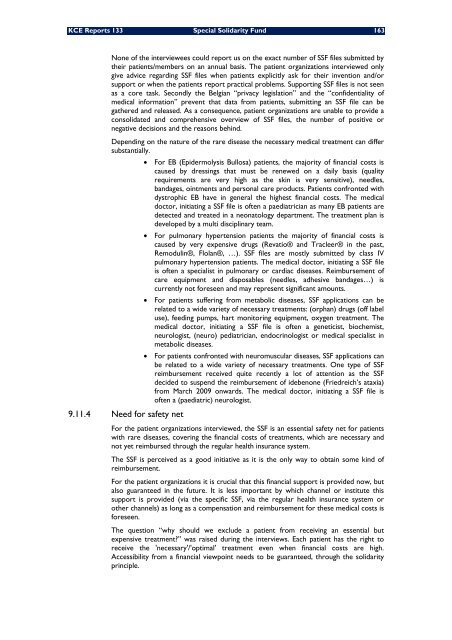Optimalisatie van de werkingsprocessen van het Bijzonder ... - KCE
Optimalisatie van de werkingsprocessen van het Bijzonder ... - KCE
Optimalisatie van de werkingsprocessen van het Bijzonder ... - KCE
Create successful ePaper yourself
Turn your PDF publications into a flip-book with our unique Google optimized e-Paper software.
<strong>KCE</strong> Reports 133 Special Solidarity Fund 163<br />
None of the interviewees could report us on the exact number of SSF files submitted by<br />
their patients/members on an annual basis. The patient organizations interviewed only<br />
give advice regarding SSF files when patients explicitly ask for their invention and/or<br />
support or when the patients report practical problems. Supporting SSF files is not seen<br />
as a core task. Secondly the Belgian “privacy legislation” and the “confi<strong>de</strong>ntiality of<br />
medical information” prevent that data from patients, submitting an SSF file can be<br />
gathered and released. As a consequence, patient organizations are unable to provi<strong>de</strong> a<br />
consolidated and comprehensive overview of SSF files, the number of positive or<br />
negative <strong>de</strong>cisions and the reasons behind.<br />
Depending on the nature of the rare disease the necessary medical treatment can differ<br />
substantially.<br />
• For EB (Epi<strong>de</strong>rmolysis Bullosa) patients, the majority of financial costs is<br />
caused by dressings that must be renewed on a daily basis (quality<br />
requirements are very high as the skin is very sensitive), needles,<br />
bandages, ointments and personal care products. Patients confronted with<br />
dystrophic EB have in general the highest financial costs. The medical<br />
doctor, initiating a SSF file is often a paediatrician as many EB patients are<br />
<strong>de</strong>tected and treated in a neonatology <strong>de</strong>partment. The treatment plan is<br />
<strong>de</strong>veloped by a multi disciplinary team.<br />
• For pulmonary hypertension patients the majority of financial costs is<br />
caused by very expensive drugs (Revatio® and Tracleer® in the past,<br />
Remodulin®, Flolan®, …). SSF files are mostly submitted by class IV<br />
pulmonary hypertension patients. The medical doctor, initiating a SSF file<br />
is often a specialist in pulmonary or cardiac diseases. Reimbursement of<br />
care equipment and disposables (needles, adhesive bandages…) is<br />
currently not foreseen and may represent significant amounts.<br />
• For patients suffering from metabolic diseases, SSF applications can be<br />
related to a wi<strong>de</strong> variety of necessary treatments: (orphan) drugs (off label<br />
use), feeding pumps, hart monitoring equipment, oxygen treatment. The<br />
medical doctor, initiating a SSF file is often a geneticist, biochemist,<br />
neurologist, (neuro) pediatrician, endocrinologist or medical specialist in<br />
metabolic diseases.<br />
• For patients confronted with neuromuscular diseases, SSF applications can<br />
be related to a wi<strong>de</strong> variety of necessary treatments. One type of SSF<br />
reimbursement received quite recently a lot of attention as the SSF<br />
<strong>de</strong>ci<strong>de</strong>d to suspend the reimbursement of i<strong>de</strong>benone (Friedreich’s ataxia)<br />
from March 2009 onwards. The medical doctor, initiating a SSF file is<br />
often a (paediatric) neurologist.<br />
9.11.4 Need for safety net<br />
For the patient organizations interviewed, the SSF is an essential safety net for patients<br />
with rare diseases, covering the financial costs of treatments, which are necessary and<br />
not yet reimbursed through the regular health insurance system.<br />
The SSF is perceived as a good initiative as it is the only way to obtain some kind of<br />
reimbursement.<br />
For the patient organizations it is crucial that this financial support is provi<strong>de</strong>d now, but<br />
also guaranteed in the future. It is less important by which channel or institute this<br />
support is provi<strong>de</strong>d (via the specific SSF, via the regular health insurance system or<br />
other channels) as long as a compensation and reimbursement for these medical costs is<br />
foreseen.<br />
The question “why should we exclu<strong>de</strong> a patient from receiving an essential but<br />
expensive treatment?” was raised during the interviews. Each patient has the right to<br />
receive the 'necessary'/'optimal' treatment even when financial costs are high.<br />
Accessibility from a financial viewpoint needs to be guaranteed, through the solidarity<br />
principle.

















